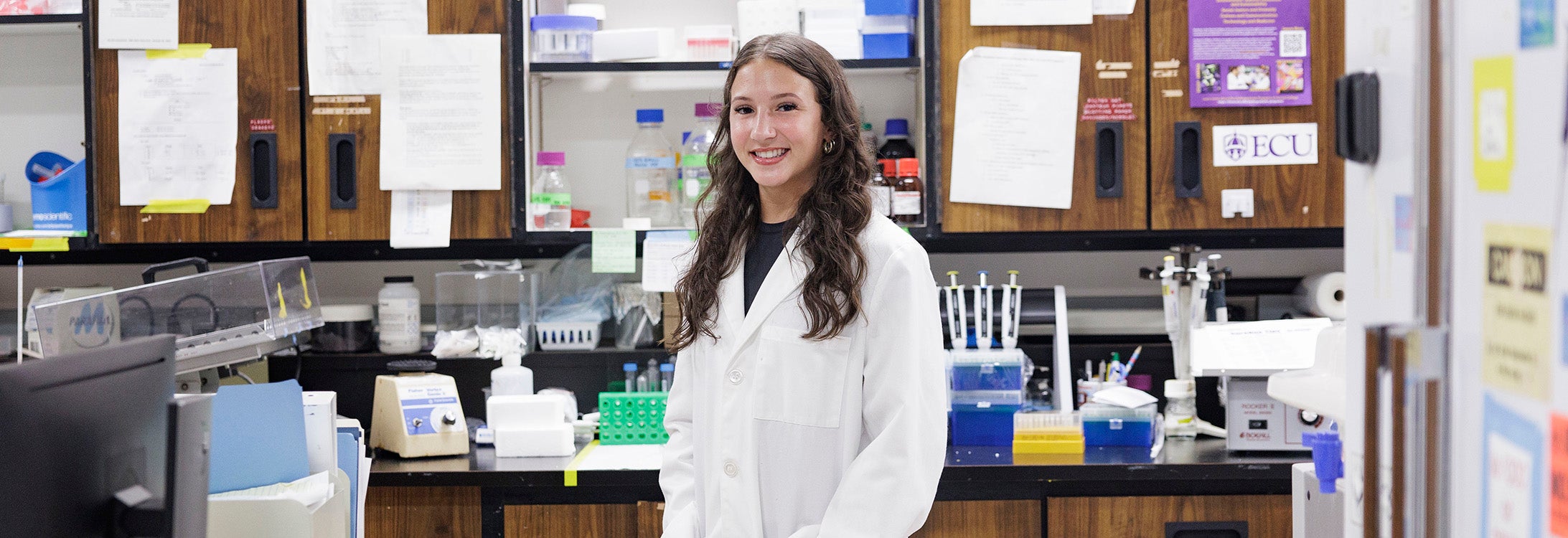First MARC students reaping benefits of mentoring, impactful research
East Carolina University juniors and seniors are receiving the chance of a lifetime through the Maximizing Access to Research Careers (MARC) training program. The immersive biomedical scholars program is a National Institutes of Health-funded initiative worth $1.2 million over five years.This program is the first NIH-funded training grant at ECU for undergraduates and currently the only one of its kind in the state. ECU was awarded funds in 2023 and recruited the first cohort of students to the program that fall.
“ECU is the perfect home for this kind of program, and I am proud that we got a program that is so beneficial for our students,” said Dr. Elizabeth T. Ables, ECU’s MARC program director and associate professor in the Thomas Harriot College of Arts and Sciences Department of Biology.
The goal of the program is to engage undergraduate students interested in pursuing doctoral education in a biomedical field. It allows participants to conduct biomedical research and build a mentoring network.
“This is a game-changer that enables students to get a jump on the hands-on experience they need to be competitive for Ph.D. and MD/Ph.D. programs,” Ables said.
Co-directors of ECU’s program include Dr. Tuan Tran, director of undergraduate research in ECU’s Office of Research, Economic Development and Engagement, and associate professor in Harriot College’s Department of Psychology; and Dr. Azeez Aileru, interim chair of the School of Dental Medicine’s Department of Foundational Sciences.
Professional Development and Research
A cohort of four students are accepted into the program each year during their junior year, with work continuing through their senior year. Between 16 and 20 ECU students will participate throughout the five-year program.
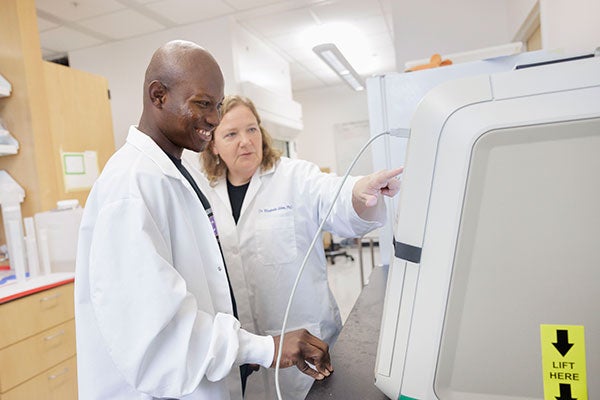
ECU undergraduate Lovens Paul and Dr. Elizabeth Ables, MARC program director, discuss Paul’s research project within the program. (Photos by Steven Mantilla)
Students receive professional development through one-on-one mentoring by biomedical research faculty across the university from Harriot College, the Brody School of Medicine or the School of Dental Medicine. They conduct 15 to 20 hours of paid (up to $14,340 per year) faculty-mentored lab research per week. Students also are responsible for their own research projects, designing experiments, collecting data and writing the work into a senior honors thesis that may become a manuscript ready for co-authorship and publication by a faculty member.
Additionally, students receive a two-year scholarship to offset up to 60% of tuition costs and fees, doctoral application preparation assistance and travel funds for a summer research internship at a major U.S. biomedical institution. These institutions include Duke, Emory, Johns Hopkins or Vanderbilt, among others, where students learn about the various cultures and strengths of other institution’s research programs.
According to Ables, this is nearly the equivalent amount of research conducted during a master’s program with specialized mentoring typically reserved for graduate students.
“This is fantastic, especially for our first-generation students who are navigating what graduate school looks like and what kind of career they want,” she said. “Being able to get experience in the lab, and not have to worry as much about rent and other finances, allows students to take the time to explore what the career is like, talk to the people around them and provides travel money to present their research at conferences.”
2023 MARC Experiences
ECU’s first group of MARC students, who are now beginning their senior year, include Lovens Paul, Bayli Locklear, Ellisa Fisher and Noah Sampson.
Lovens Paul
Paul is majoring in biochemistry under the faculty mentorship of Ables. He said having a faculty mentor has helped him grow as a researcher and built his confidence and ability to tackle challenges independently. Under Ables’ direction, Paul works with Drosophila, commonly known as fruit flies, and seeks to understand how a new transport protein impacts stem cell activity.
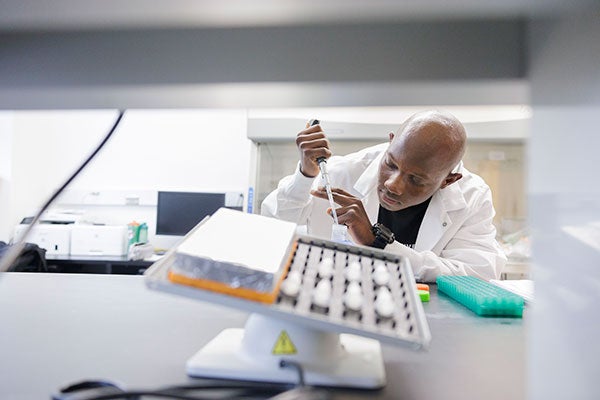
Lovens Paul studies stem cells of fruit flies and seeks to understand how a new transport protein impacts stem cell activity in humans.
“I love doing research. It has helped me to think critically, pose questions my textbooks have not answered and think about ways to solve them,” he said. “For example, in my research, I study stem cells. They are critical for the maintenance and repair of tissues in our bodies and contribute to the rejuvenation of the organism. This research is important since the Drosophila germline stem cells provide an excellent model for studying human stem cells, and many fundamental processes in stem cell biology are conserved across species.”
This summer, Paul conducted research at Vanderbilt University in Nashville, Tennessee, in the lab of Dr. Kristopher Burkewitz, assistant professor of cell and developmental biology in the School of Medicine. Paul used advanced imaging techniques to study how organisms manage their nutrients under different conditions. The work focused on understanding how resource allocation impacts longevity and reproduction, which has broad implications for health and aging biology.
“This experience not only allowed me to work on cutting-edge research but also helped me expand my understanding of the academic and professional opportunities ahead,” Paul said.
After completing his undergraduate degree at ECU, Paul intends to pursue a doctorate in biomedical science, and he hopes to conduct research in regenerative medicine, and cell and developmental biology.
Bayli Locklear
Locklear is majoring in biology and sociology under the faculty mentorship of Dr. Rukiyah Van Dross-Anderson, professor in the Department of Pharmacology and Toxicology at the Brody School of Medicine and adjunct professor in Harriot College’s Department of Chemistry.
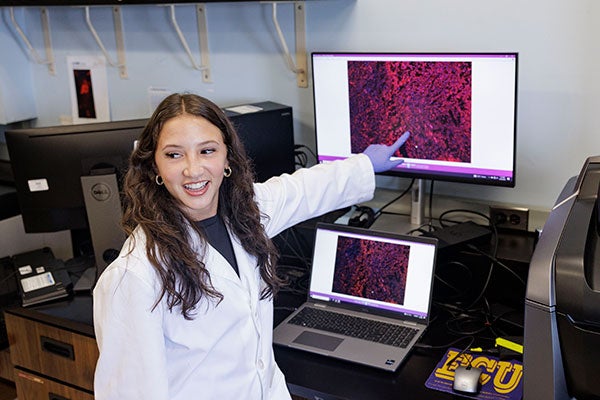
Bayli Locklear, a member of the first MARC student group at ECU, is researching the effects certain drugs have on colon cancer cells and tumor growth.
“As a MARC student during my undergraduate training, I had the opportunity to conduct research at my home institution, Alabama State University, and research-intensive institutions including Washington State University and the National Institutes of Health. These experiences formed the basis of my decision to become a biomedical researcher,” Van Dross-Anderson said. “I am honored and humbled to take part in the training of a new generation of MARC scholars.”
“It is an honor to be a member of the first MARC cohort at ECU,” Locklear said. “I am extremely grateful for the opportunity, and it has altered the course of my college career positively.”
Alongside Van Dross-Anderson, Locklear is conducting research on colon cancer cells and the effects certain drugs — specifically the patented molecule PMJ2 — have on colon cancer cells and tumor growth in mice. Van Dross-Anderson’s previous work showed that PMJ2 caused colon cancer cell death. Locklear is analyzing stained colon tumor cells under fluorescent light to identify immune cells that may be responsible for this antitumor activity, and identify and quantify the different immune cell types present in tumors treated with PMJ2 or the agent in which PMJ2 is dissolved.
“Bayli is making excellent progress in her research, and she has become an expert in sectioning tissues and performing immunohistochemical analysis,” Van Dross-Anderson said.
“Having a faculty mentor means having someone to guide, encourage and support you during your research experience,” Locklear said. “Being mentored by Dr. Van Dross-Anderson, I am learning more than basic research techniques. I have learned the importance of the research for future treatment, the severity and stages of colon cancer and the shortcomings of current treatments.
“She also has taught me that not all experimental results are linear. There will be times when my results aren’t what I wanted to see, but it is okay. She has helped me learn how to be confident in my research.”
Locklear conducted her summer research internship at the University of Virginia in the lab of Dr. Qiwei Wang, who researches breast cancer. Locklear explored a biological pathway called STING in breast cancer tumor cells that, if activated, can cause the tumor cells to die. She learned about cell culture and several new experimental techniques she has not used for her research at ECU. The basis of her project was treating breast cancer tumor cells with varying amounts of STING pathway activators to see what concentrations cause the most cell death.
“It was very different from my work at ECU, which is exactly what I was looking for,” she said. “I enjoyed learning new techniques and seeing how different cancers are researched.”
Once Locklear completes her degree at ECU, her goal is to attend graduate school and pursue a doctoral degree in microbiology.
“The MARC program is helping me understand what routes I can go with biomedical research, so my plan will be developed along the way,” she said. “I would like to continue to conduct hands-on biomedical research, but I haven’t decided if industry or academia is a better option for me.”
Ellisa Fisher
Fisher is an Honors College student majoring in engineering with a second degree in chemistry. She is being mentored by Dr. Colin Burns, professor in the Department of Chemistry.
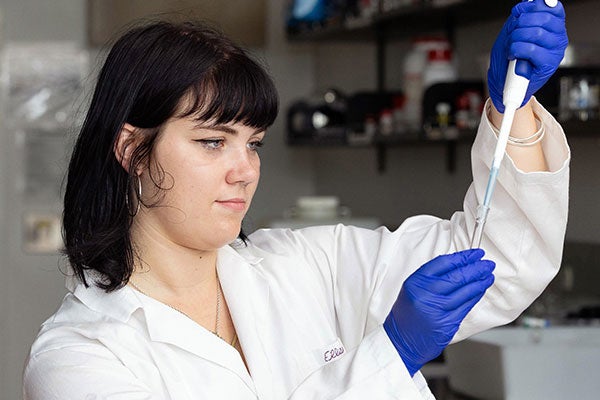
Ellisa Fisher is helping to research a drug delivery method that has successfully killed melanoma and colon cancer cells invitro in mice. (Photo by Rhett Butler)
“Being a member of MARC has been an integral part of my college experience,” Fisher said. “While I had been involved in research before receiving the award, the MARC scholarship and stipend have allowed me to dedicate significantly more time to research and work related to my desired career field.”
Fisher’s research with Burns entails characterizing micelles (carrier molecules) as a drug delivery mechanism for Burns’ patented tumor-killing molecule; 15-deoxy-Δ12,14-prostaglandin J2 (PMJ), which has been successful in killing melanoma and colon cancer cells invitro and in the invivo treatment of superficial tumors in mice. However, as a hydrophobic drug, PMJ has difficulty being delivered intravenously to other types of cancers.
“Using micelles to administer the drug proves advantageous because of their size, which can be tailored to diameters between 10-100 nm (nanometers), often allowing them to accumulate in the leaky vasculatures of tumors while being too large to enter functioning, healthy tissues,” Fisher said. “My studies have focused on sizing the micelles through dynamic light scattering and identifying a critical micelle concentration value using fluorescent testing. This project has introduced me to obstacles in drug design that I had not ever thought about before and has emphasized the amount of research required when designing a new treatment. I have also assisted with molecule synthesis and purification, which has allowed me to become even more literate in chemistry through hands-on experience and observation.”
Fisher appreciates the hands-on research and added benefits of the MARC program.
“I have enjoyed taking what I have learned in class and applying it to solve problems that affect us in everyday life,” she said. “Dr. Burns’ research is particularly important because PMJ has shown abilities to selectively kill tumor cells while not damaging healthy cells, which could offer a potentially better alternative cancer treatment to chemo. Characterizing a viable method to deliver this drug could lead to it being possibly picked up for clinical trials in the future and being further developed into a treatment available to the public.”
Fisher conducted her summer research internship at N.C. State University, where she worked in the lab of Dr. Richard Spontak. She characterized antimicrobial polymer material, specifically researching the ability of the material to kill canine staph. Her goal was to identify how long it takes for the bacteria to die after exposure to the polymer. She also assisted Spontak’s doctoral student in synthesizing the material and characterizing it through dynamic light scattering and UV spectroscopy.
“This research has introduced me to material science, which is an application of chemistry I had not previously encountered,” Fisher said. “I have been exposed to many new laboratory techniques and equipment, which has made my summer research experience unique and allowed me to develop even more as a researcher.”
After Fisher completes her degrees at ECU, she plans to attend graduate school in the United Kingdom and pursue a master’s degree in chemical engineering. She said she is attracted to the pharmaceutical industry at Cambridge, and that her experiences will allow her to have a successful career in research or industry.
Noah Sampson
Sampson is an Honors College student majoring in biology and chemistry under the faculty mentorship of Dr. Mark Mannie, professor in the Department of Microbiology and Immunology at Brody.
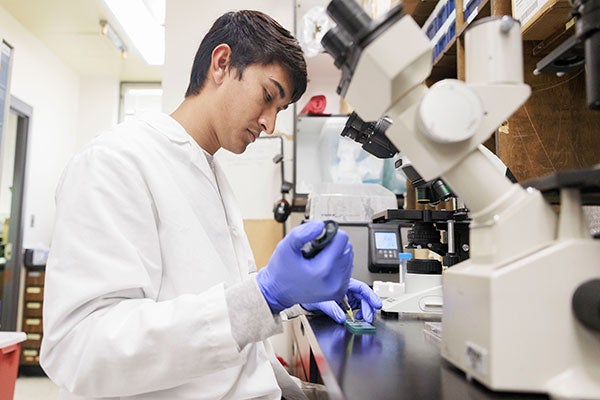
Noah Sampson’s research focuses on regulatory T cells as a treatment for autoimmunity – when the human body’s immune system attacks its cells.
“It is a blessing to be a MARC scholar. This program has allowed me to pursue research experiences allowing me to grow both academically and professionally,” Sampson said.
Sampson’s research with Mannie is focusing on the use of regulatory T cells as a treatment for autoimmunity. Autoimmunity is when the human body’s immune system attacks its own cells. This concept is the basis for autoimmune diseases like Type 1 diabetes or multiple sclerosis.
“Regulatory T cells serve as an immunological off-switch that controls immune responses,” Sampson said. “My work with Dr. Mannie is focused on the interaction between regulatory T cells and cytokines, with an overall goal of increasing the autologous proliferation of regulatory T cells.”
Sampson sees various benefits from working in the lab to having a faculty mentor.
“Being a part of Dr. Mannie’s lab for three semesters has been awesome, and I look forward to the next two,” he said. “I have been able to significantly grow as a scientist. As a scientist, you will inevitably face roadblocks and challenges. My lab has not only helped me overcome these challenges but also taught me how to solve problems independently, which I believe is extremely valuable. I really value the insight and guidance that my mentor has given me.”
This summer, Sampson conducted his research internship at Wake Forest University through its Excellence in Cardiovascular Sciences Program. Sampson was paired with a faculty member and worked to produce original research that was presented at a poster symposium at the end of the summer. He attended weekly seminar series, and lectures on cardiovascular disease, geriatric assessments, effective scientific communication and research ethics.
When Sampson completes his degrees from ECU, he is interested in continuing his research and in applying to medical or doctoral programs.
Looking Towards the Future
This fall, ECU’s 2024 MARC cohort includes biology majors Neil Garza Hernandez and Allison Simmons, chemistry major Haley Williams, and Robin Thomas, an Honors College student majoring in biology and chemistry.
The new students participated in a team-building retreat over Labor Day weekend, where they learned about research ethics. By mid-September, they will choose the research labs they will work in and meet with prospective mentors to help build their research networks.
Ables said ECU’s MARC program synergizes well with two other STEM workforce development programs awarded to ECU. They are complimentary programs because each one targets students at a slightly different stage in their academic journey.
“What’s exciting about this project and receiving this award is that it happened in the same time frame as Dr. Vance-Chalcraft’s NSF-LSAMP grant and Dr. Stephanie Richards and Dr. Ariane Peralta’s GlaxoSmithKline Foundation training grant in partnership with Fayetteville State University,” Ables said. “These three programs are increasing access to research careers at an early stage in students’ training. It is an exciting time for undergraduate research on campus, and there is a concerted effort at ECU to find and make these opportunities happen for our students.”
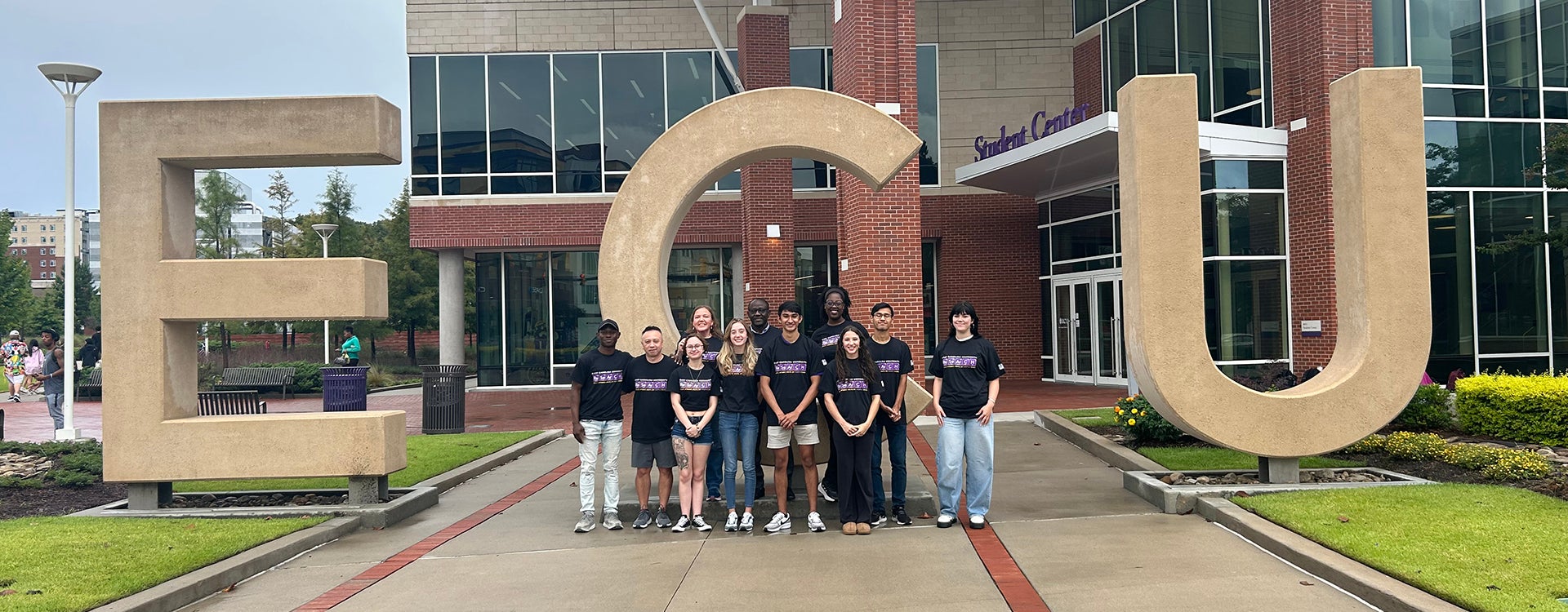
ECU undergraduate students and faculty who make up the MARC training program met at the beginning of the semester to participate in a team-building retreat and learn about research ethics. (Photo by Amanda Powell)
